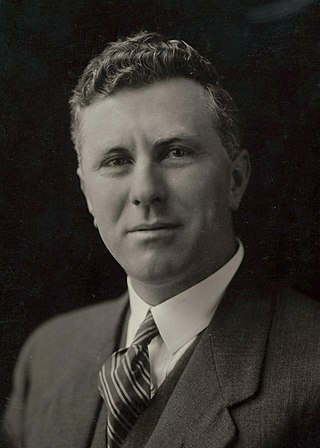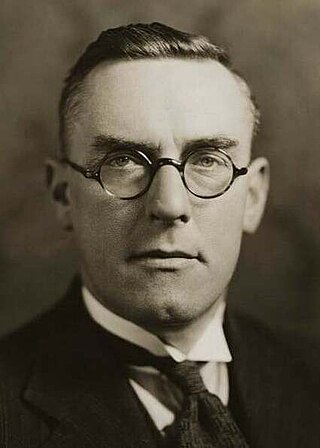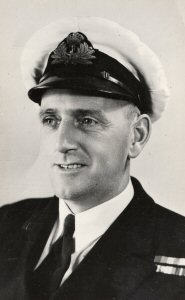
Eric Elliott Reece, AC was Premier of Tasmania on two occasions: from 26 August 1958 to 26 May 1969, and from 3 May 1972 to 31 March 1975. His 13 years as premier remains the second longest in Tasmania's history, second to only Robert Cosgrove. Reece was the first Premier of Tasmania to have been born in the 20th century.

Sir Robert Cosgrove was an Australian politician who was the 30th and longest-serving Premier of Tasmania. He held office for over 18 years, serving from 1939 to 1947 and from 1948 to 1958. His involvement in state politics spanned five decades, and he dominated the Tasmanian branch of the Australian Labor Party for a generation.

Sir Walter Henry Lee KCMG was an Australian politician and member of the Tasmanian House of Assembly. He was Premier of Tasmania on three occasions: from 15 April 1916 to 12 August 1922; from 14 August 1923 to 25 October 1923; and from 15 March 1934 to 22 June 1934.

Sir John Cameron McPhee, KCMG was an Australian politician and member of the Tasmanian House of Assembly. He was Premier of Tasmania from 15 June 1928 to 15 March 1934.

James Allan Guy, CBE was an Australian politician who represented the Australian Labor Party in both the Tasmanian House of Assembly and the Federal House of Representatives, before leaving to represent the United Australia Party and then the Liberal Party of Australia in both the House of Representatives and the Senate. His father, James Guy, had also been a Senator.

The 1919 Tasmanian state election was held on 31 May 1919 in the Australian state of Tasmania to elect 30 members of the Tasmanian House of Assembly. The election used the Hare-Clark proportional representation system — six members were elected from each of five electorates.

The 1928 Tasmanian state election was held on Wednesday, 30 May 1928 in the Australian state of Tasmania to elect 30 members of the Tasmanian House of Assembly. The election used the Hare-Clark proportional representation system — six members were elected from each of five electorates.

The 1937 Tasmanian state election was held on 20 February 1937 in the Australian state of Tasmania to elect 30 members of the Tasmanian House of Assembly. The election used the Hare-Clark proportional representation system — six members were elected from each of five electorates.

The 1941 Tasmanian state election was held on 13 December 1941 in the Australian state of Tasmania to elect 30 members of the Tasmanian House of Assembly. The election used the Hare-Clark proportional representation system — six members were elected from each of five electorates.

The 1948 Tasmanian state election was held on 21 August 1948 in the Australian state of Tasmania to elect 30 members of the Tasmanian House of Assembly. The election used the Hare-Clark proportional representation system — six members were elected from each of five electorates.

The 1950 Tasmanian state election was held on 6 May 1950 in the Australian state of Tasmania to elect 30 members of the Tasmanian House of Assembly. The election used the Hare-Clark proportional representation system — six members were elected from each of five electorates.

The 1955 Tasmanian state election was held on 19 February 1955 in the Australian state of Tasmania to elect 30 members of the Tasmanian House of Assembly. The election used the Hare-Clark proportional representation system — six members were elected from each of five electorates.

The 1956 Tasmanian state election was held on 13 October 1956 in the Australian state of Tasmania to elect 30 members of the Tasmanian House of Assembly. The election used the Hare-Clark proportional representation system — six members were elected from each of five electorates.

The 1959 Tasmanian state election was held on 2 May 1959 in the Australian state of Tasmania to elect 35 members of the Tasmanian House of Assembly. The number of members were increased from this election from 30 to 35. The election used the Hare-Clark proportional representation system — seven members were elected from each of five electorates.

Reginald 'Rex' Colin Townley CMG was an Australian politician who served as leader of the Liberal Party in Tasmania from 1950 to 1956. He also played first-class cricket for the Tasmanian cricket team in his younger years, dismissing Donald Bradman in the 1935 season.
This is a list of members of the Tasmanian House of Assembly between the 25 March 1916 election and the 31 May 1919 election. At the 1916 election, no party won a majority, and the Liberals' Walter Lee became Premier of Tasmania. During the term, the Liberal Party converted into the new Nationalist Party, and the Labor Party split over conscription. However, most of the Parliamentary Labor Party stayed with the executive, and the two MHAs who left the Party switched to federal politics. The state of flux, however, resulted in four seats switching from Labor to Nationalist at by-elections and recounts.
This is a list of members of the Tasmanian House of Assembly between the 10 June 1922 election and the 3 June 1925 election. The fledgling Country Party got five members elected, including two former Nationalists, but by the end of the term the party had all but merged into the Nationalist Party. A new Liberal Party emerged before the 1925 election, counting the support of three MHAs.
Carrol Athelstone Bramich was an Australian politician. He was a member of the Tasmanian House of Assembly from 1946 to 1964, representing the electorate of Darwin for both the Labor Party (1946–1956) and the Liberal Party (1956–1964). He served as a minister under Labor Premier Robert Cosgrove until his sudden floor-crossing defection in 1956.

Sir Henry Seymour Baker was an Australian politician and lawyer. He served in the Parliament of Tasmania for nearly 40 years, initially as a Nationalist and Liberal in the House of Assembly (1928–1946) where he spent periods as attorney-general (1928–1934) and leader of the opposition (1936–1946). He later served in the Legislative Council (1948–1968), including as president (1959–1968). He was born in England and spent most of his childhood in New Zealand, arriving in Australia as a teenager.

The Tasmanian Labor Party, officially known as the Australian Labor Party and commonly referred to simply as Tasmanian Labor, is the Tasmanian branch of the Australian Labor Party. It has been one of the most successful state Labor parties in Australia in terms of electoral success.
















